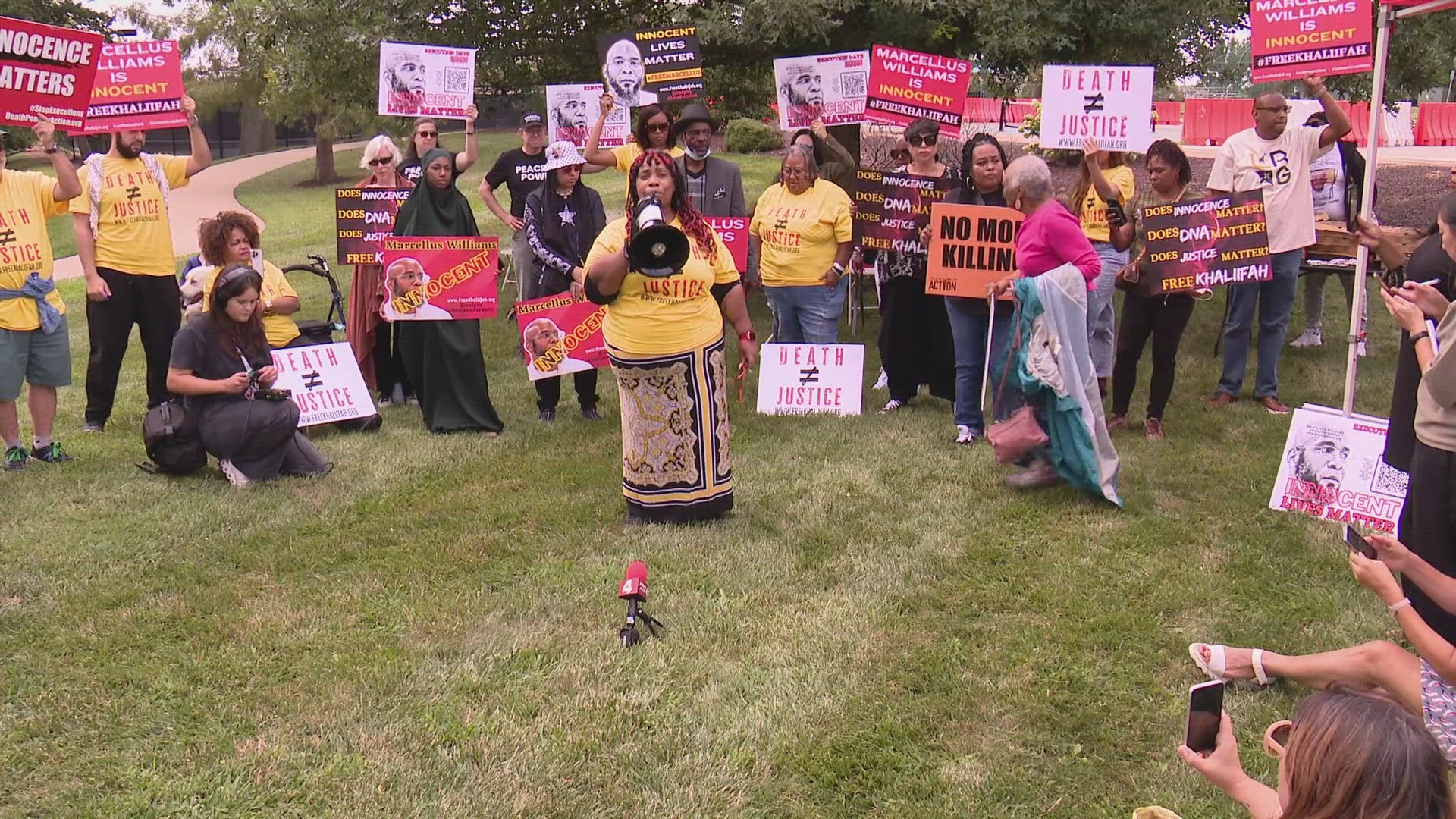ST. LOUIS — The Missouri Supreme Court said the execution date for Marcellus Williams will remain in place despite Williams reaching a deal on Wednesday that St. Louis County Circuit Judge Bruce Hilton said would allow the death-row inmate to avoid execution.
On Wednesday, Williams entered an Alford plea, an affirmation of guilt made by a defendant while they maintain their innocence and is synonymous with a "no contest" plea. It's most often used in plea bargaining when there is little evidence of being acquitted.
The plea is a consent agreement between Williams' lawyers and the St. Louis County Prosecuting Attorney's Office. The deal will sentence Williams to life in prison without the possibility of parole. The original counts against Williams remain unchanged as part of the plea.
Missouri Attorney General Andrew Bailey's office attempted to block the plea, but Judge Hilton denied the office's objection, saying the consent agreement was "proper judgment." Bailey's office then appealed to the Missouri Supreme Court as Bailey sought to move ahead with the execution, arguing that a circuit court doesn't have the authority to overrule the state Supreme Court that set the execution date.
Early Thursday, Missouri Supreme Court Chief Justice Mary Russell said Bailey's appeal was moot because Judge Hilton could not change Williams' sentence to life in prison. In her ruling, Russell said the circuit court needed to set aside Wednesday's order and hold the previously scheduled evidentiary hearing and allow Bailey's office to be a part of it. The judge can then make a ruling on the case no later than Sept. 13.
The circuit court was scheduled to hold a formal sentencing at 8:30 a.m. Thursday, but instead used the appearance to set an evidentiary hearing for Aug. 28.
Wednesday, prosecutors were prepared to say he was wrongly convicted, claiming new DNA evidence from the weapon does not show a match to Williams, but that never happened. The court learned the weapon was mishandled after the crime. DNA was removed and added from it over a 3-year period following the murder. Those new developments led Williams to enter the Alford plea.
“Marcellus Williams is an innocent man, and nothing about today’s plea agreement changes that fact," Williams' lawyer Tricia Bushnell said in a statement to the Associated Press. She noted that the family of the victim, Lisha Gayle, supports setting aside the death penalty and the plea “brings a measure of finality” to the family.
"If there's a question about someone's innocence, we can't execute someone in that circumstance," St. Louis County Prosecuting Attorney Wesley Bell said after the agreement. "We think this is an appropriate resolution at this juncture."
Bailey's office attempted to block the plea, but Judge Hilton denied the office's objection, saying the consent agreement was "proper judgment." Bailey's office then appealed to the Missouri Supreme Court, leading to Thursday's decision from the Missouri Supreme Court.
The circuit court was scheduled to hold a formal sentencing at 8:30 a.m. Thursday and that would allow Gayle's family to speak. Williams' attorney, Tricia Bushnell, said Gayle's family supports setting aside the death penalty.
“I am proud of how hard we have fought for the rule of law in this case," Bailey said in an emailed statement to 5 On Your Side Wednesday evening. “The victims in this case deserve better. Missourians deserve better.”
The deal's announcement was made after negotiations began Tuesday into Wednesday morning on Williams' case before Hilton. Prosecuting Attorney Wesley Bell filed a motion to vacate Williams' 1998 first-degree murder conviction in the stabbing death of Gayle, a former St. Louis Post-Dispatch reporter.
New DNA evidence that matched the knife to a person other than Williams prompted Bell to reexamine the case. However, the murder weapon was handled "without proper procedures in place and DNA was removed and added during the years between 1998 and 2001". During the hearing, the attorney's office said it "regrets" that the weapon wasn't properly handled during Williams' initial trial.
Attorney General Andrew Bailey (R) stated in a June court filing that “evidence supporting conviction at trial was overwhelming,” despite the new DNA claims.
Monday morning, the courtroom was packed with supporters for Williams, including his family, multiple exonerees and organizations like Missourians for Alternatives to the Death Penalty.
At noon, a large group of supporters held a rally at Shaw Park nearby.
Following the hearing, multiple people spoke to reporters, including his son.
Marcellus Williams Jr. said, "Today is not the decision I would lean towards because I want full exoneration, because I feel whole-heartedly that he is innocent."
He continued by saying, "My father is strong in his faith, really resilient and intelligent and if he needs to be the vessel of sacrifice to promote change, then so be it."
Williams Jr. was thankful for the support, especially from the exonerated men.
"A man either had to decide to live or to continue to fight for justice risking his own life in the same way," said Nimrod Chapel of the NAACP.
The Missouri Supreme Court set Williams' September execution date on June 4, hours after it ruled that Parson, a Republican, was within his rights when he dissolved a board of inquiry convened by former Gov. Eric Greitens after he stopped Williams' originally scheduled 2017 execution.
The inquiry board, consisting of five retired judges, never issued a ruling or concluded whether the new DNA evidence exonerated Williams. Parson dissolved the board in June 2023, saying it was time to “move forward.”
Johnathan Shiflett, spokesperson for Parson, said the governor “will give thoughtful consideration to the question of clemency for Mr. Williams, just as he has for all other capital punishment cases during his tenure, but no decision has been made at this time.”
Parson, a former county sheriff, has been governor for 11 executions and never granted clemency.
The Associated Press contributed to this article.

